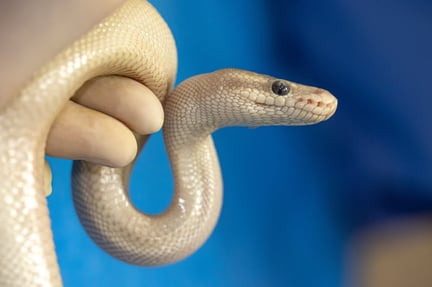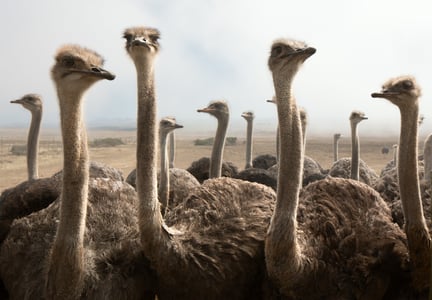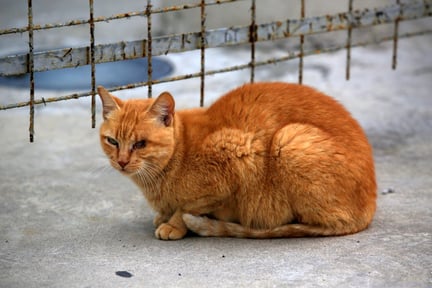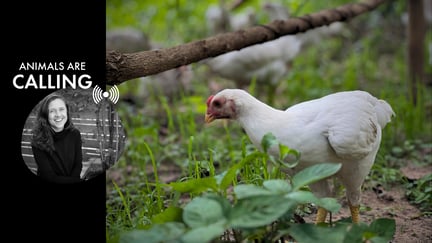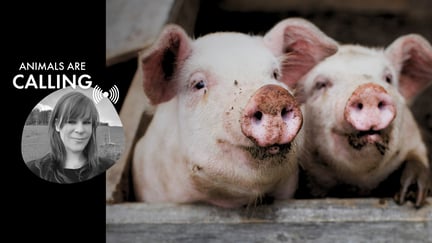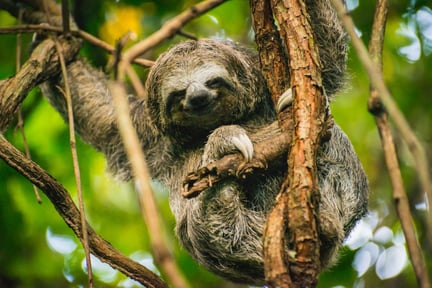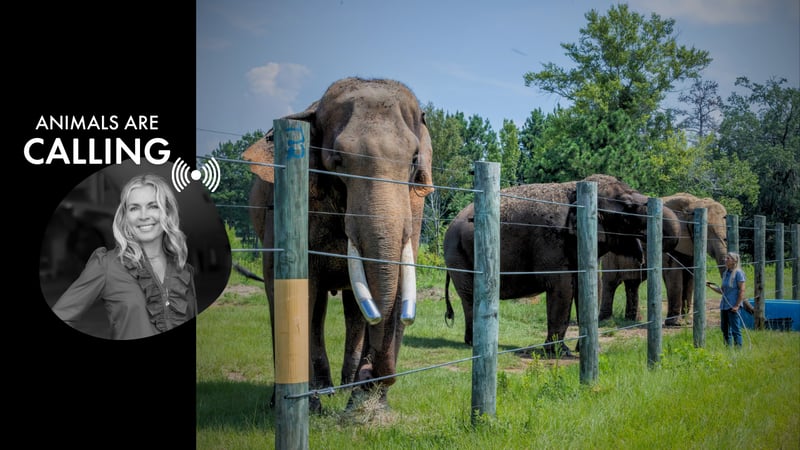
Animal sentience & the importance of keeping wildlife in the wild
Blog
In this Q&A, we discuss the suffering of sentient wild animals when they are kept in captivity for tourist entertainment or as exotic pets.
- Join World Animal Protection as we explore the complex emotional and social world of animals
- This transcript is taken from the World Animal Protection podcast, Animals are Calling, hosted by John Bunyan
- In this episode, we explore why sentient animals have a right to a wild life
- We talk to Carol Buckley, founder of Elephant Aid International, Sofie Lund, Head of Communications and PR at the Nordic Leisure Travel Group, and Janek Andre who runs We Whale, to find out how different wild animals cope — or fail to cope — in captivity
- We also ask Dr Helen Lambert, a scientist specialising in animal sentience, to weigh in on why animals in the wild must be protected from cruel exploitation
Wild animals are born to be wild. In this Q&A, World Animal Protection speaks to Carol Buckley, Sofie Lund, Janek Andre, and Dr Helen Lambert about the suffering of sentient wild animals when they are kept in captivity for tourist entertainment or as exotic pets. We expose why animals’ safety and wellbeing should be protected against commercial exploitation.
Do animals have complex emotions and behaviours?
Carol Buckley, founder of Elephant Aid International, has over 40 years of experience working with elephants. She explains that animals are complex and it can be hard for us to understand what their behaviour means.
For example, although all elephants are different, most African elephants have the same reaction to things that scare them. They make themselves big by putting their ears out and charging at the thing that’s frightening them.
Elephants are also incredibly intelligent animals with a lot of willpower. When elephants are exploited for tourism, they see it as being held captive, being made to do things they don’t want to do, and not having the right to make their own decisions.
How is our understanding of animal sentience evolving?
Sofie Lund, Head of Communications and PR at the Nordic Leisure Travel Group, an organisation partnering with World Animal Protection to ensure their wildlife tourism is responsible and ethical, explained how her understanding of animal sentience has evolved over the years.
“20 years ago, I actually travelled to Thailand with my five-year-old son and we stayed working as volunteers at an elephant camp in the northern part of Thailand. Back then, even though this was supposed to be the best place to take care of mistreated elephants, we were riding the elephants. Entering the partnership with World Animal Protection has opened my eyes to how cruel that was because, back in 2004, we thought we were doing the best we could. I'm looking forward to learning more about how to interact with these incredible animals in the best possible way.”
How does this understanding support the argument against keeping animals in captivity?
Doctor Helen Lambert, a scientist who specialises in animal sentience, weighs in here.
“When we understand that wild animals are sentient, we understand that they have their own preferences and desires. The captive world can't replicate those. You can do your best but we don't know how important certain natural behaviours are to an animal.
How important is it for a cheetah to hunt down and kill their prey, for example? We simply don't know the psychological impact that handing their food to them has.
For herbivores, foraging is really important. In captivity, they become very stressed and depressed when they can’t fill their time by searching for food. It's like being retired with no hobbies and being kept in a room with nothing to do. You're going to get bored and depressed.”
Does that include exotic pets? Should it?
Lambert explains why people want to keep lizards, snakes, and frogs as pets.
“People believe that, if they’re captive-bred rather than taken from the wild, it’s ethical. Unfortunately, although they're captive-bred, they aren’t domesticated. They're still wild and have the same instincts and needs as wild animals.
In the wild, corn snakes travel for miles. In captivity, they’re often kept in a tank that's two-thirds of their length. We’ve learned that snakes prefer to stretch out. Not being able to has physiological and psychological effects on them. So, we can use our understanding of animal sentience to help explain why keeping exotic pets isn’t in the animals’ best interests.”
What about animal observation as tourism?
Our experts agreed that observing animals in their natural habitat is generally the most ethical way to experience them, but even then we need to be aware of any potential harm we might do.
Andre Janek was inspired to found We Whale after seeing orcas at SeaWorld in his teens. Seeing animals who belonged in the sea being forced to perform left him in tears. Even now, he’s critical of how many animal observation experiences are carried out.
“There's a lot of harassment out there with boats going into big pods of dolphins, interfering in their feeding and their resting.”
We Whale focuses on showing guests whales and dolphins in a way that respects the animals. Visitors learn about the animals and how to behave in the environment. These kinds of ethical experiences give an authentic glimpse into the animals’ lives while respecting their sentience.
How can people support keeping wildlife in the wild?
Lund, who has experience working with World Animal Protection to ensure Nordic Leisure TravelGroup’s wildlife tourism is responsible and ethical, shares the advice she’s learnt.
She says it’s important to understand that any interaction that you can have with a wild animal is only possible because they were broken down and exploited. It's against their nature to let someone touch them, ride them, or even feed them.
She warns against buying tickets to any form of animal entertainment or taking selfies with animals. She also stresses the importance of researching the venues we go to. There are great zoos out there, but we need to take responsibility for making sure that we’re supporting those that prioritise animal welfare. When you experience an animal at a distance, you’re seeing how they really behave. There’s an authenticity to those experiences that can’t be matched with captive, exploited animals.
Help us expose the commercial exploitation of animals
When we understand that wild animals are sentient, it becomes clear that there’s no moral justification for keeping them as pets or exploiting them for entertainment. Taking the time to find ethical wildlife tourism options is key to respecting animals and avoiding suffering.
For more information about animal sentience or to get involved in our wildlife campaigns, visit World Animal Protection. If you enjoyed these highlights, listen to the full podcast.
Animal sentience news & blogs
-
14 interesting facts about pythons
Blog
Discover the most interesting facts about pythons. We share python facts about their size, behaviour, habitat, threats, and...
-
14 Wonderful & Weird Ostrich Facts
Blog
Discover top ostrich facts as we answer your burning questions, including what do ostriches eat, how fast can...
-
Outrage as 246 pilot whales killed in bloody Faroe...
News
A brutal whale hunt in the Faroe Islands leaves 246 dead. We are demanding an immediate end to...
-
Facebook exposed as top platform for animal cruelty
News
Meta platforms are responsible for the majority of reported online animal abuse.
Related content
“Meat Animals” are Living Individuals
Blog
In this Q&A, explore what our understanding of — and cultural disconnect from — animal sentience means for farmed “meat animals” and their future welfare.
A conversation on Sentience In Animals
Blog
In this Q&A, we examine the evidence for sentience in animals and explore what it means for our relationship with them.
Animal Sentience
At World Animal Protection sentience is at the heart of everything we do, click to find out more.
